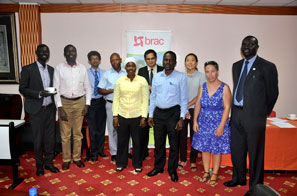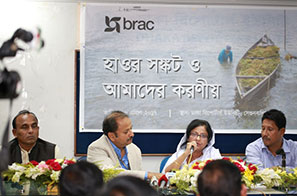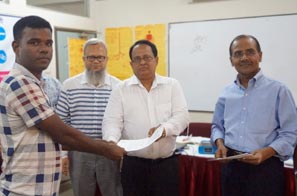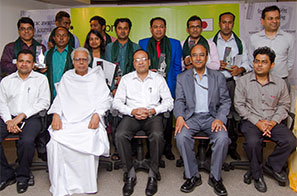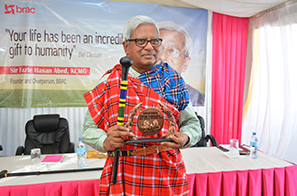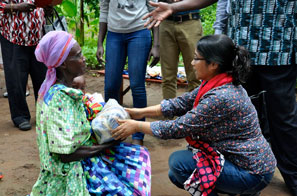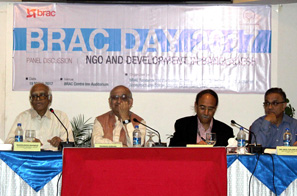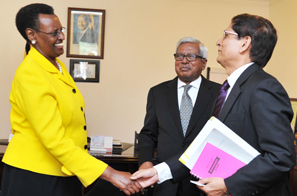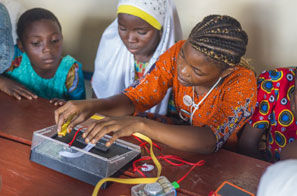
English (961)
Children categories
Sphere Standards Review
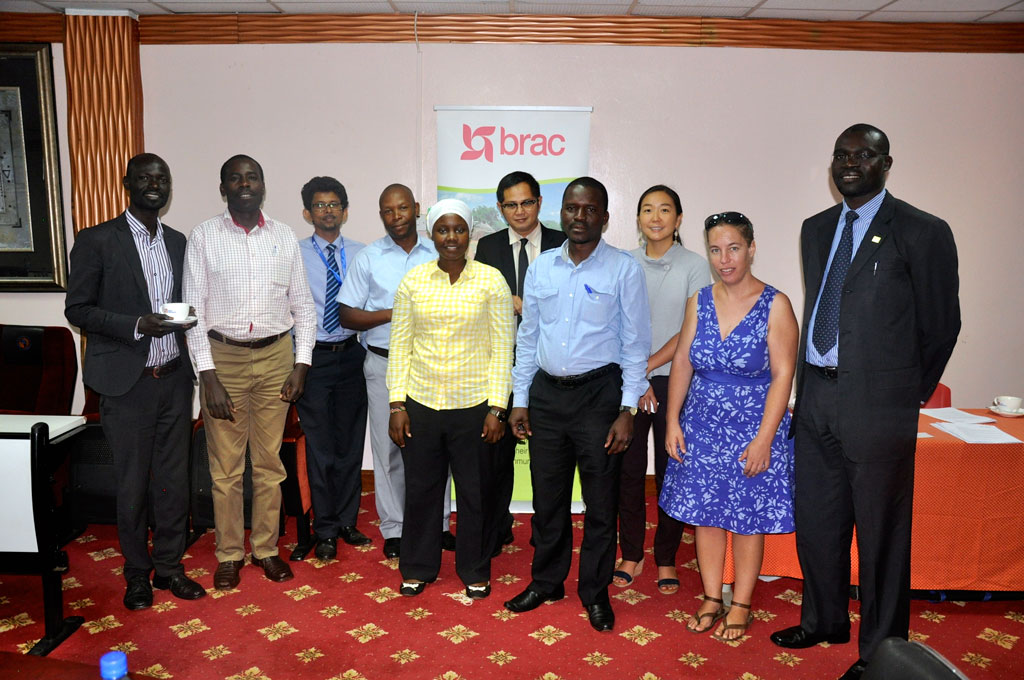 Participants at the Sphere Standards Review consultation convened by BRAC in Uganda
Participants at the Sphere Standards Review consultation convened by BRAC in Uganda
BRAC Uganda’s Emergency Response Programme organised a consultation workshop to review the Sphere Standards in Uganda on 12 April 2017, at Africana Hotel in Kampala.
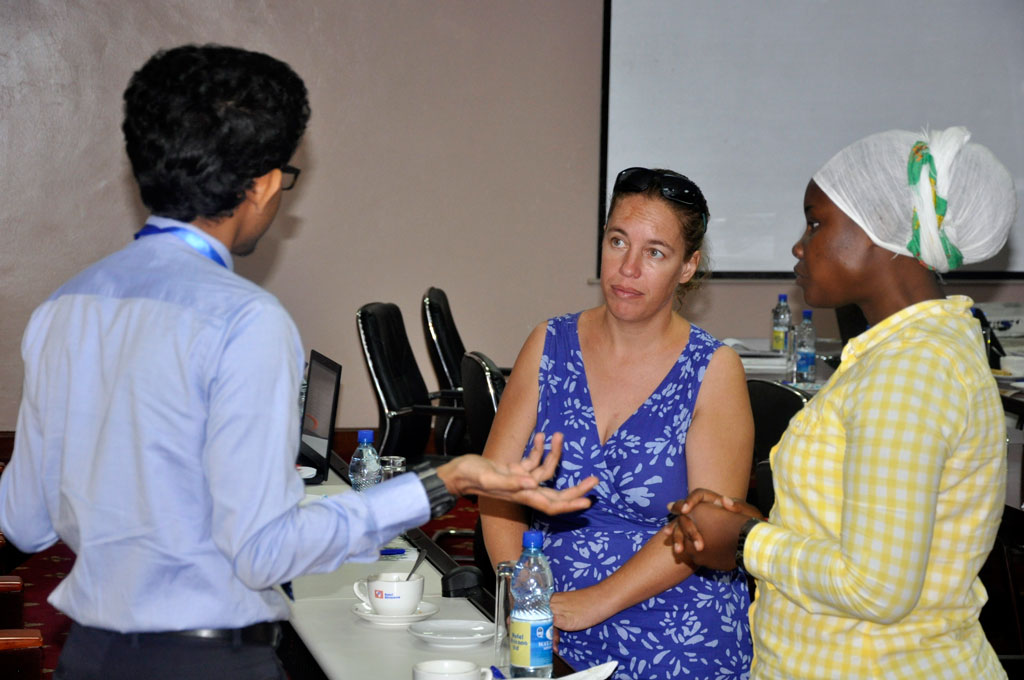
BRAC convened the meeting of development partners in Uganda, including UNDP, Adventist Development and Relief Agency (ADRA), Lutheran World Federation (LWF), War Child, Mercy Corps, Caritas and Catholic Relief Services, to share experiences from across different development sectors – food security and nutrition, WASH and health, shelter and non-food items, as part of a review exercise that will eventually feed into the overall global revision of the Sphere Handbook 2018 edition. According to the Sphere Project website, the year-long review and revision process offers opportunities for all users across the globe to engage and participate in the Handbook’s revision.
The Sphere Standards are the collective minimum set of principles that humanitarian actors agree to be guided by and harmonise the interpretation and execution of various interventions. The Standards stem from the Sphere Project - a voluntary initiative that brings a wide range of humanitarian agencies together around a common aim - to improve the quality of humanitarian assistance and the accountability of humanitarian actors to their constituents, donors and affected populations.
1-year postponement of waterbody lease demanded
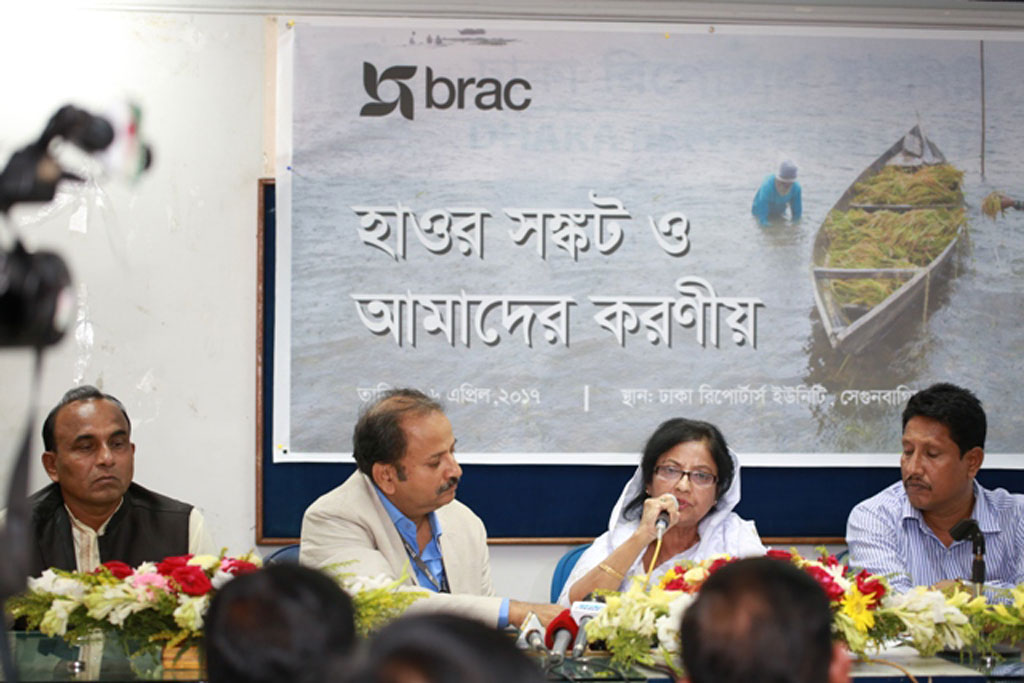
BRAC expressed today that it supports the demand of local communities for authorities to postpone the leases of haor waterbodies for one year and allow people affected by the current flooding to continue open-water fishing.
BRAC organised the press conference titled 'Haor crisis and our responsibilities' today on Wednesday (26 April 2017) at the Sagar-Runi Auditorium of Dhaka Reporter's Unity. BRAC arranged the press conference focusing on the responsibilities and plans to address the crisis on a long-term basis.
Joya Sengupta, lawmaker from the Sunamganj-2 constituency, Gawher Nayeem Wahra, director, BRAC Disaster Management and Climate Change programme, and KAM Morshed, director, Advocacy for Social Change, were present at the press conference. Representatives from the grassroots development organisations were also present at the event including, Nazmul Haque, executive director, Institute of Development Affairs (IEDA), MH Talha Chowdhury, executive director, Upama - Unnayan Parikalpanay Manush, and Muhammed Musa, executive director, Chetona Paribesh O Manob Unnayan Sangstha, Faruq Ahmed, chairman, Ashtogram union council, and Bidhan Chandra Chowdhury, chairman, Sulla union council.
Jaya Sengupta said, ‘The Ministry of Disaster Management and Relief has already started distributing relief in the haor area. We want other organisations to come forward to the aid of the affected people as BRAC is doing.’ She further warned that if the Water Development Board fails to take immediate measures to solve the waterlogging problem of the haor area such crises will return again.
Gawher Nayeem Wahra said, 'BRAC has already undertaken an emergency relief initiative for the five haor districts. Our initiative comprises distribution of fodder to 7,000 families and immediate assistance for 50 thousand families worth BDT 15 crore, but relief is not enough to solve this crisis. We need long-term planning with pragmatic solutions.'
Local public representatives expressed deep concern over the distribution of relief, saying that many people cannot collect the relief as they have not been properly informed of the time and place of distribution. They also demanded more budget allocation to ensure proper rehabilitation of those affected.
BRAC to train bus drivers to reduce road accidents
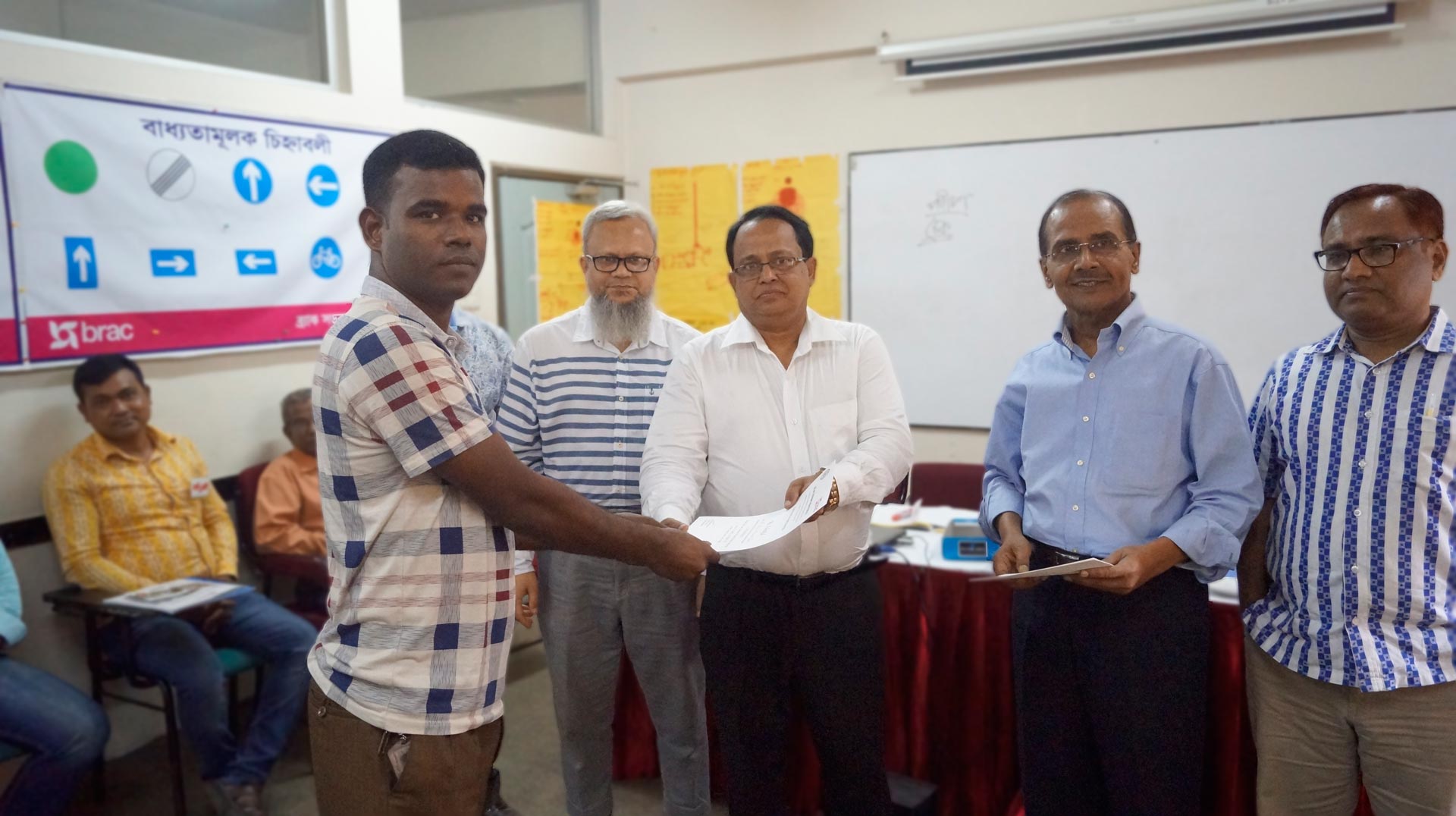
At a recent event held in BRAC Driving School (BDS) in Dhaka, speakers stressed the urgency of ensuring international standard drivers training for all professional drivers. They also stated that such training would improve the attitude and skills of the drivers resulting in safer roads for all.
Earlier in April, ENA Transport Company, which is one of the biggest bus operators in Bangladesh decided to train 200 of its drivers by BRAC Driving School. These drivers are being put through a three-day residential training called Shurakkha. This is a defensive driving training course for in-service bus and truck drivers and focuses on modifying their attitude and behaviour.
On 18 April, M Mashiur Rahman, who is both secretary of National Road Safety Council and chairman of Bangladesh Road Transport Authority visited BDS to observe this training and distributed certificates to the successful participants. In his speech he urged upon all transport companies to help the government in reducing road crash by training their drivers. "Think about your families when you drive. It will encourage you to drive safely." he said to the participants. He urged that in-service drivers should consider driving training from institutions like BDS after expressing his contentment on Shurakkha.
BRTA's director of Road Safety, Mahbub e Rabbani and director of training, M Sirajul Islam, director of BRAC's road safety programme, Najmul Hussain and the managers and trainers of BDS attended the event.
Since 2012, BRAC Driving School has been offering Shurakkha. The course was developed by BRAC with support of Hubert Ebner - an organisation specialised in drivers training.
A study by BRAC reveals that the training not only improved safe driving skills of drivers but saved 30 per cent of transport operating costs. Shurakkha is provided in two formats - a three-day residential training and the other is a two-day residential and practical road test using vehicle mounted P - Drive system that grades drivers on their attention to safety, driving, attitude and behaviour.
BDT 15 crore emergency flood relief effort launched
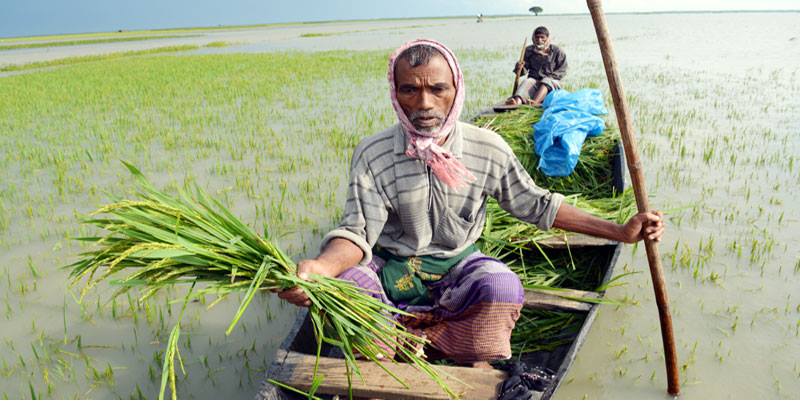
BRAC will support 50 thousand families over the next month to cope with the immediate impact of the floods on their crops and livelihoods.
The non-governmental development organisation had already begun its regular relief efforts immediately after the floods hit. With the fast deterioration of the situation and spread of floodwaters, it is undertaking added emergency relief activities. A long-term rehabilitation programme will be launched in coming months, depending on the needs of the changing situation.
The emergency relief programme will be carried out in four districts; Kishoreganj, Sunamganj, Habiganj and Netrokona, in coordination with local government authorities.
Gawher Nayeem Wahra, director of BRAC's Disaster Management and Climate Change programme said, 'The situation has rapidly deteriorated in the last 48 hours. A new crisis has also emerged as fish and ducks are also dying, in addition to the widespread flooding of crops. This effort will support families to cope with the immediate crisis’.
10 journalists get Migration Media Award
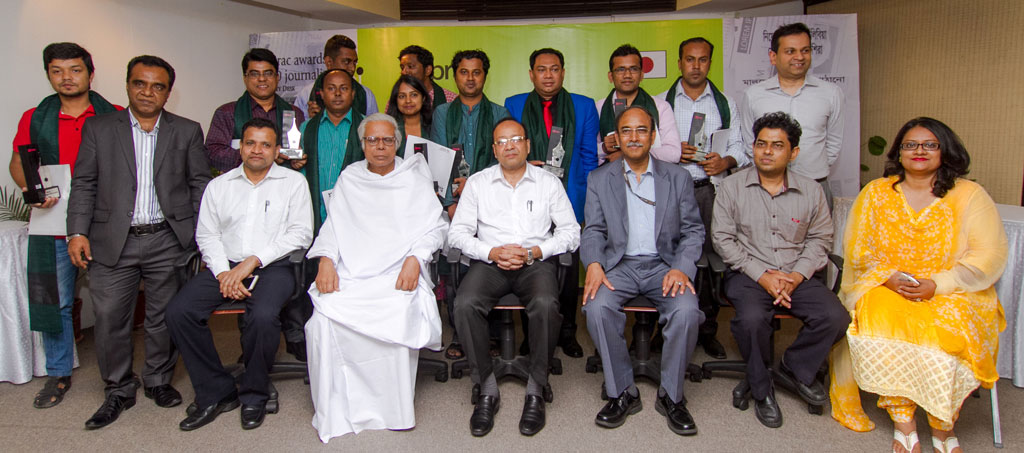
Ten media professionals received Migration Media Award 2016, an initiative of BRAC to recognise the media’s role in promoting safe migration through objective journalism. The awards were given at a ceremony organised today on Wednesday (12 April 2017) at the BRAC Centre in the Dhaka city.
The awardees are:
Print media – 1st – Belal Hossen Biplob, The Daily Star; 2nd - Adil Sakhawat, Dhaka Tribune; 3rd - Abu Jor Ansar Uddin Ahamod, The Daily Samakal.
Television report – 1st – Mashrequl Islam Rahat, Maasranga TV; 2nd – Sabina Yesmin, ATN News; 3rd – Meraj Hossen Gazi, Bangla Vision.
Television programme – 1st – Hassan Ahamed Chowdhury Kiron, for programme telecast on ATN Bangla.
Radio – 1st – Md Mustafizur Rahman, Bangladesh Betar.
Online – 1st – Md Shariful Islam Hasan, Daily Prothom Alo.
Local journalism – 1st – Faruque Ahmad, Trishal upazila correspondent, The Daily Ittefaq.
Additional secretary to the Ministry of Expatriates’ Welfare and Overseas Employment Jabed Ahmed attended the event as the chief guest with BRAC executive director Dr Muhammad Musa in chair. Noted writer and researcher Syed Abul Muksud was present as the special guest. The jury board members Syed Ishtiaque Reza, director news, 71 TV, Robaet Ferdous, associate professor, Department of Mass Communication and Journalism, Dhaka University, KM Ali Reza, deputy chief, Ministry of Expatriates’ Welfare and Overseas Employment, and Jasiya Khatoon, director, WARBE-DF, were also present. BRAC Senior director for strategy, communication and empowerment Asif Saleh moderated the event.
Additional secretary Jabed Ahmed said, ‘The government wants everyone who seeks to work abroad has skill training before migrating. But it is not easy, it is a challenging task.’
Writer and researcher Syed Abul Muksud said, ‘We should not blame the government for all that are going wrong with the migrant workers. To solve the issues the government along with individuals, civil society, recruiting agencies, NGOs and representatives from the international NGOs needs to work hand in hand.’
BRAC ED Dr Muhammad Musa called on the media professionals to focus in their work all the sides of the migrant workers’ life right from the pre-departure situations to their effort to reintegrate into the society after coming back home. Hassan Imam, programme head, BRAC Migration Programme, in his keynote paper also said the media can play an even more effective role by giving coverage to the issues migrant workers or those aspiring to go abroad face at all the phases including the realities they deal with after they return.
Sir Fazle in Tanzania
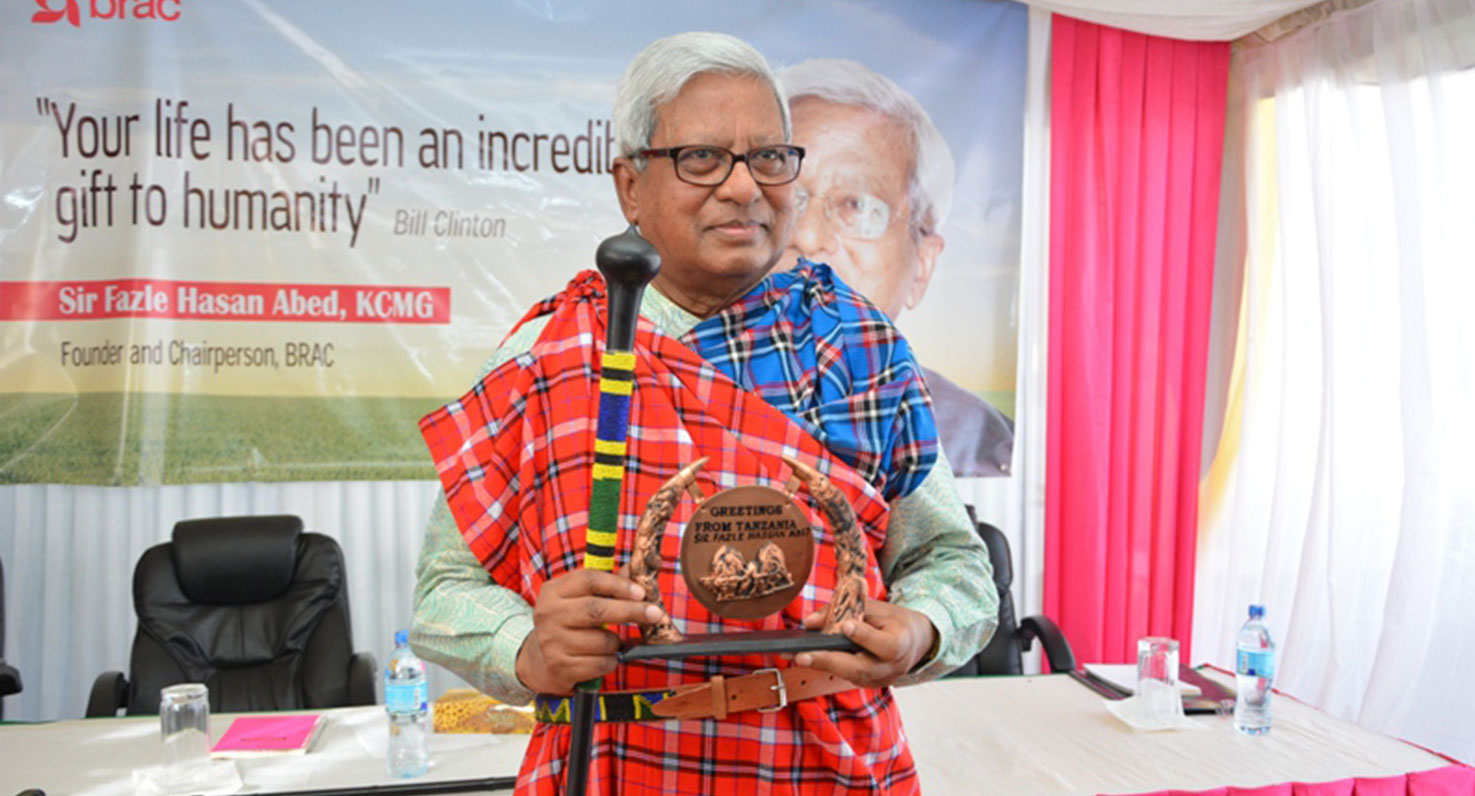
Sir Abed holding his gift after he was named Respected Elder of Tanzania by BRAC in Tanzania Staff
It was a special day for BRAC Tanzania, as the long awaited arrival of Sir Fazle Hasan Abed finally took place on 4 March 2017. His last visit was four years ago and since then a lot has changed with the addition of many new faces, most of who has only read stories of the great leader.
On his visit, Sir Fazle met with senior staff as well as the board members to discuss BRAC's role in Tanzania and the way forward. He had meetings with various potential partners, including representatives from UNICEF, and the Ambassadors of Canada, the Netherlands and Ireland.
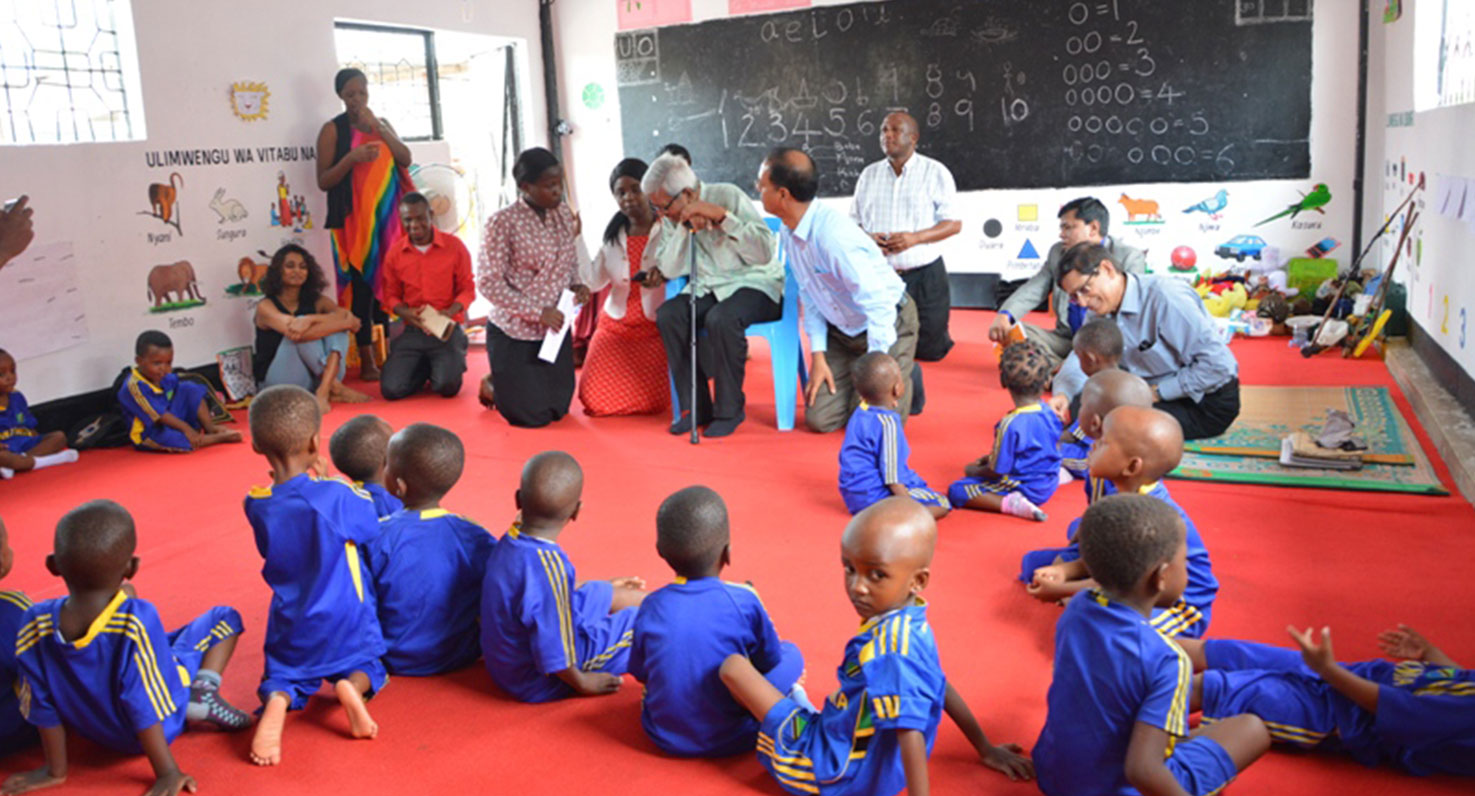
Sir Abed getting briefing from Education team when he visited Play Lab project at Temekem, Dar es salaam
Sir Fazle visited different parts of Tanzania to visit our programmes. He visited the DFID funded Girls' Education Challenge in the Mwanza region. He met with teachers from public schools and students from our in-school mentoring sessions, and visited a newly established library, courtesy of BRAC. He met with LEAD producer groups and microfinance women’s groups. The chairperson was happy to see BRAC’s impact in these communities. In Dar es Salaam, Sir Fazle was taken to visit the Play Lab Project, our latest early childhood development project.
On the final day of the visit, Sir Fazle was honoured with a surprise declaration of a Respected Elder of Tanzania. Sir Fazle was dressed in the traditional maasai outfit, a sign of acceptance in Tanzania’s elderly community.
The 2nd National Stakeholders Workshop
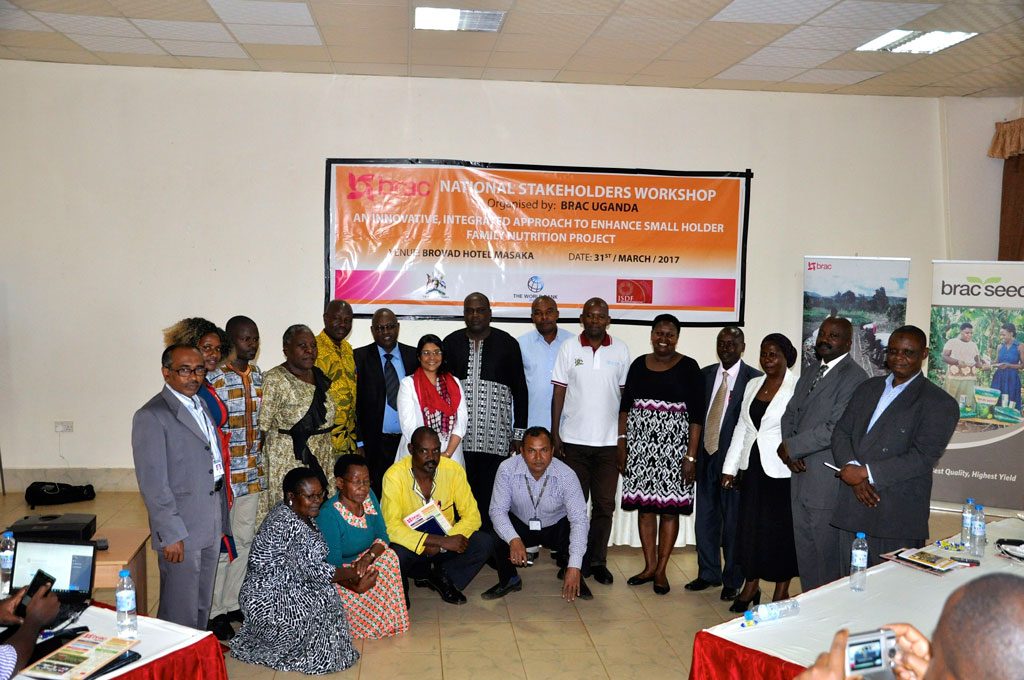 Participants at the JSDF Nutritional Project National Stakeholders Workshop
Participants at the JSDF Nutritional Project National Stakeholders Workshop
The Innovative, Integrated Approach to Enhance Smallholder Family Nutrition project, simply known as the JSDF Nutrition project, organised a stakeholder’s forum in Masaka Town, in central Uganda, to discuss nutrition and how to reduce cases of stunting among the project’s target population.
The workshop was presided over by Mr Ssansa Mugenyi, Director of Policy and Coordination at the Office of the Prime Minister. Mr Mugenyi chairs the JSDF Nutrition Project Steering Committee. Other members of the committee present were Agnes Baku, Ministry of Health, Alex Bambona, Ministry of Agriculture, and Dr. Goretti Semakula from the National Agriculture Research Organization. Stakeholders present at the half-day workshop included district health officers, district production and marketing experts, chief administrative officers and resident district commissioners, as well as farmers and BRAC volunteers.
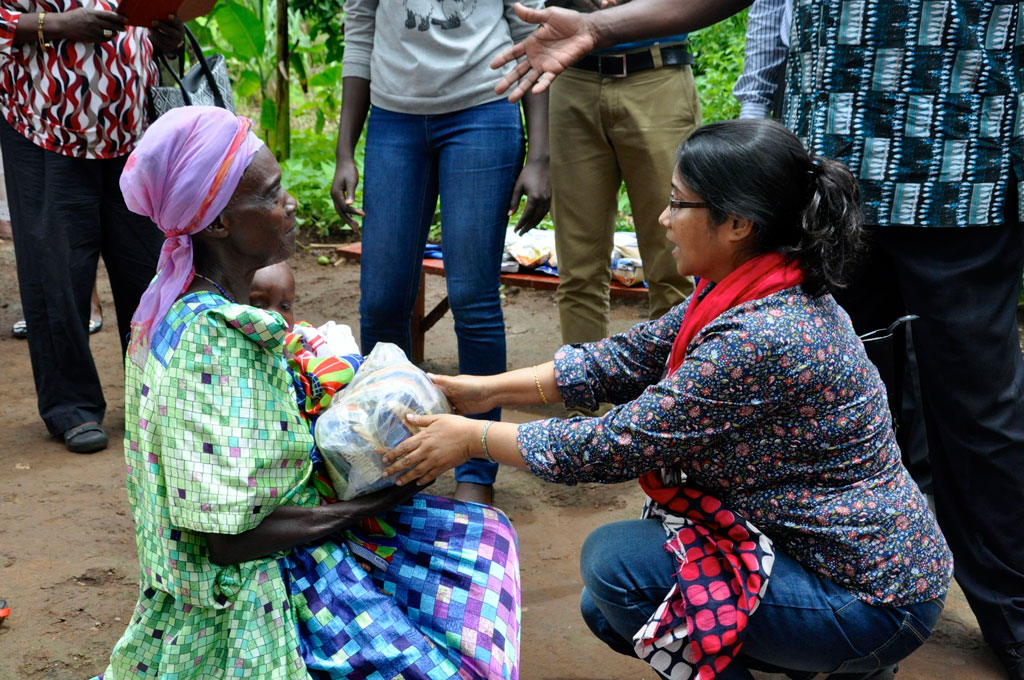 Hasina Akhter, the Country Representative for BRAC in Uganda, presents the mother of a malnourished child with fortified flour during a project health forum
Hasina Akhter, the Country Representative for BRAC in Uganda, presents the mother of a malnourished child with fortified flour during a project health forum
The previous day, the project steering committee conducted a field visit that included farmer training sessions, a health forum for mothers of under-2 children and a tour of an orange fleshed sweet potato farm.
The JSDF Nutrition project is a multisectoral intervention through which BRAC Uganda aims to improve the nutrition condition of 19,200 households in four districts through increasing the production and consumption of Vitamin-A rich foods, including the orange fleshed sweet potato (OFSP). The project combines BRAC’s agriculture, health and microfinance services and is funded by the Japan Social Development Fund (JSDF) through the World Bank.
NGO role can be crucial in tackling terrorism

While NGOs in Bangladesh are contributing to the socio-economic development, they can also play a significant role to curb the rising threat of terrorism. Government strategies and plans should create space for effective engagement of these organisations in this regard.
Speakers said these today on Sunday at a discussion titled 'NGO and development', organised at the BRAC Centre in the capital on the occasion of BRAC Day.
They also observed that creating an environment for comfortable co-existence of the government and the NGOs has become evermore important now.
Noted economist and chairman of Centre for Policy Dialogue Professor Rehman Sobhan was the chief guest at the programme.
Moderated and chaired by BRAC executive director Dr Muhammad Musa, the event was also attended among others by Professor Wahiduddin Mahmud, former adviser to Caretaker Government and executive director of CAMPE Rasheda K Choudhury, chief coordinator for SDG affairs at the prime minister's office Abul Kalam Azad and Professor SR Osmani of Ulster University in the UK.
Professor Rehman Sobhan stressed GO-NGO coordination in the pursuit of Sustainable Development Goals saying that the prime minister can have meetings with the NGOs regarding the implementation of programmes to achieve the SDGs.
He observed that ‘micro-credit’ programmes of the NGOs have played ‘remarkable’ role in poverty alleviation and BRAC, as one of the largest NGOs of the world, has played significant role in this regard. Having cited examples from similar initiative in India, he further suggested that following their examples social business enterprises in Bangladesh also can share their profit with their producers.
Professor Wahiduddin Mahmud observed that at present the relation between the government and NGOs is rather that of ‘an uneasy coexistence’. ‘I think this should be turned into a comfortable coexistence. The NGOs have played crucial role not only in poverty reduction, but also in education, health, family planning and increasing women’s participation in employment.’
‘There was a time when women could not ride bike. Nor could they go to school. There was mass reluctance about family planning. NGOs played a crucial role to change the situation. And as they did it, they have the capacity in tackling the rising religious terrorism. The government can particularly engage them in spreading the spirit of non-communalism,’ he further said.
Rasheda K Chowdhury called on the micro-credit practitioners to reduce interest rates and loan processing costs to increase the overall poverty-reduction efficiency of these programmes>
BRAC Research and Evaluation Division (RED) director Professor Abdul Bayes delivered the keynote presentation.
Citing government and donor data, he said between 2002 and 2016, one crore 10 lakh (11 million) households came out of ultra poverty. Of them, about 15 per cent - around 18 lakh (1.8 million) families have escaped ultra poverty with the integrated assistance from BRAC.
He further said, 90 per cent of those who came out of ultra poverty with BRAC assistance have done so by securing sustainable development. Besides reducing ultra poverty, BRAC also significantly contributes to the national management of tuberculosis infection, medical treatment of cataract and ensuring of quality primary education.
He added that while through its micro-credit programme BRAC helps alleviate poverty, it also contributes to the social development of poor communities. It has so far, helped 30 lakh (3 million) people in the hard-to-reach areas sustainably access safe water, trained 5 crore (50 million) people across the country on maintaining a healthy life and supplied sanitary latrines in 3 crore (30 million) households.
Stressing the challenges of the NGO sector, the speakers said partnership between the government and NGOs should further deepen in the face of reducing foreign development aid, which will help secure finance for such organisations. Innovation of new social business enterprises can also become a potential strategy to increase their financial stability. Bangladeshi NGOs should come up with new management techniques and system also as the country is steadily progressing towards becoming a middle-income country, they further said. They emphasised that these organisations should also increase their capacity and transparency, while run social development programmes besides distributing micro loans.
Speakers from BRAC added that currently BRAC micro-credit has reached 50 lakh (5 million) clients. The organisation is now in the process of overhauling its programmes with special focus on reducing ultra poverty, quality improvement of pre-primary education, capacity building to sustainably tackle climate change impacts, increase quality of health and nutrition, youth employment and women empowerment.
Sir Fazle in Uganda
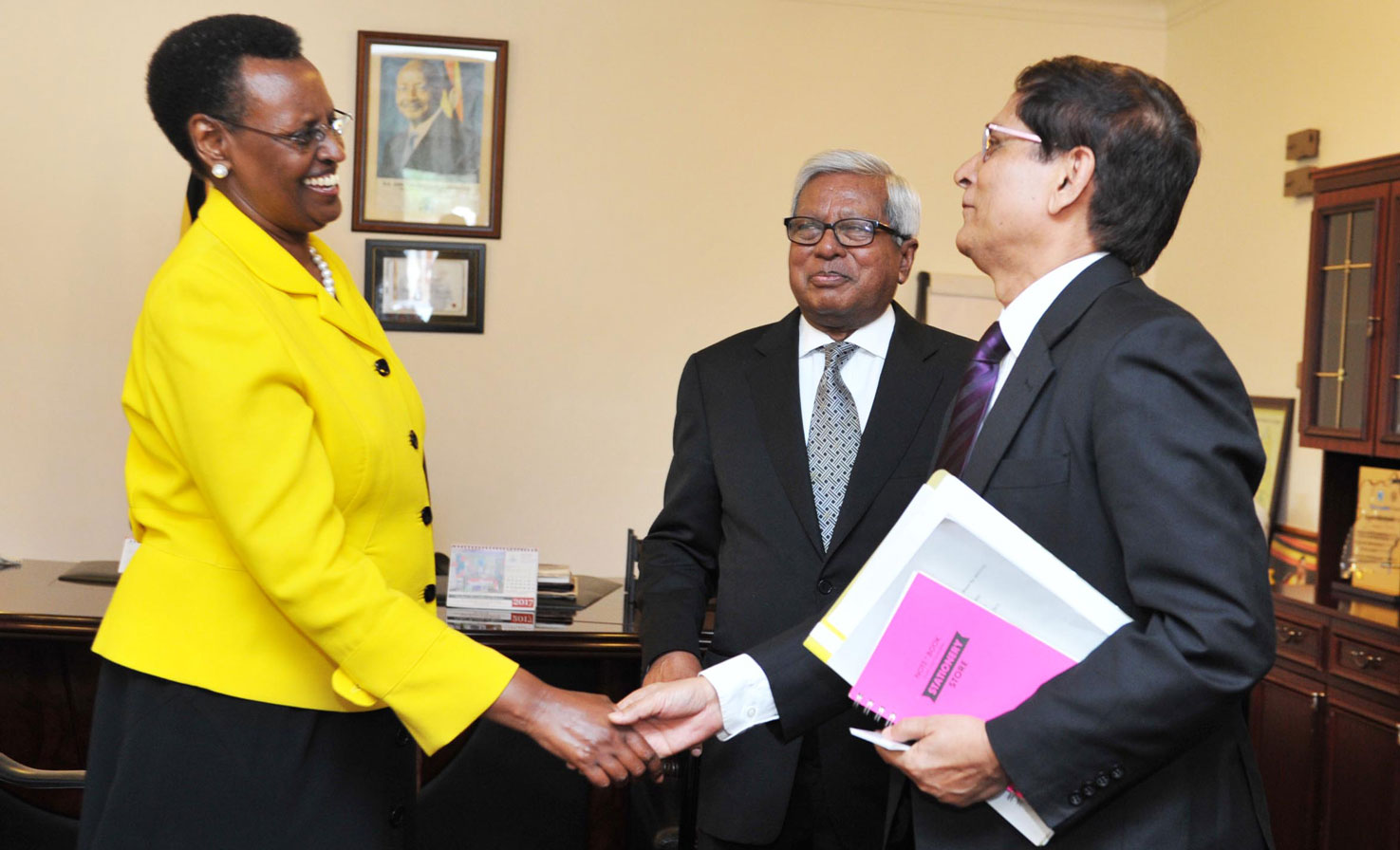
Sir Abed and Executive Director of BRAC International, Mr. Faruque Ahmed meeting Honorable Minister of Education and Sports and the First Lady of Uganda, Ms. Janet Kataha
Sir Fazle Hasan Abed visited Uganda from 11-16 March 2017. On his visit, he met various government officials including Janet Kataha, the first lady and the minister of education and sports; Dr Ruhakana Rugunda, prime minister of Uganda, and Matia Kasaija, minister of finance, economic planning and development. In addition, Sir Fazle interacted with various development partners including the World Bank country manager, Christina Malmberg Calvo; the Dutch Ambassador, Henk Jan Bakker, and representatives of UNICEF and UNFPA.
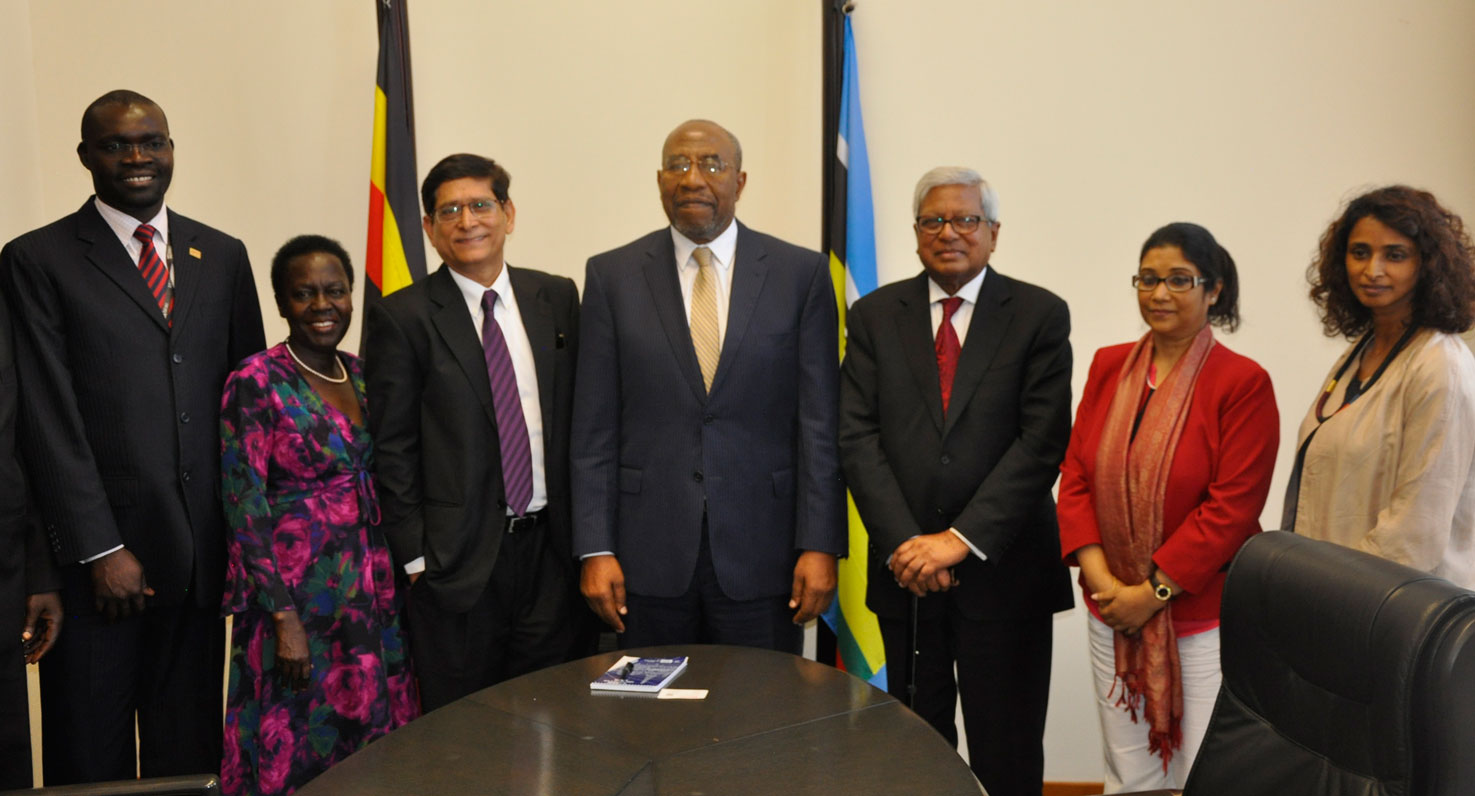
Sir Abed and senior staff of BI with Rt. Honorable Prime Minister of Uganda, Dr Ruhakana Rugunda
Sir Fazle also met prominent thinkers from the areas of agriculture, education, employment and development in Uganda.
BRAC Uganda hosted a networking dinner for Sir Fazle where representatives of development partners, universities, and the media were invited.
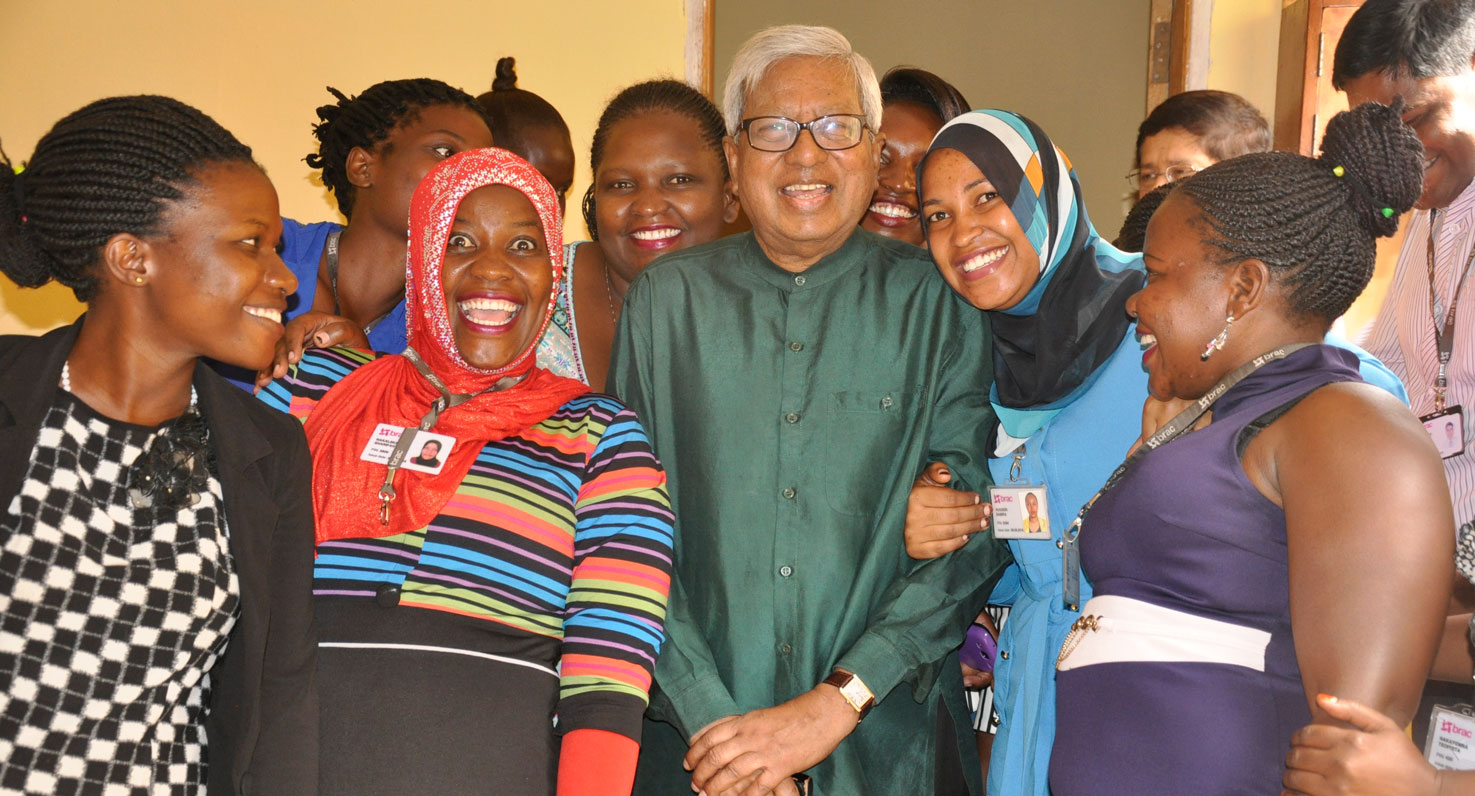
Sir Abed with BRAC Staff in Uganda
Sir Fazle also visited BRAC programmes. He visited Kasangati Branch Office, a microfinance group in Kasangati, two small enterprise clients, and St Julian High School, a partner school for the MasterCard Foundation Scholars Program at BRAC. He also visited the BRAC agriculture research and seed processing centre in Nakaseke.
BRAC Launched Innovative Code Clubs for Girls
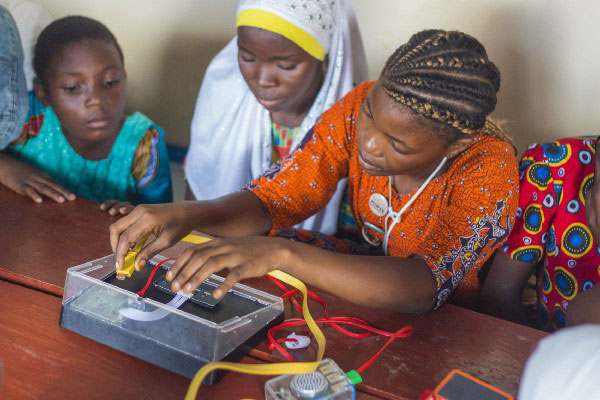
Aisha is a young, hopeful girl who wants to be a Fashion Designer. Dressed in a bright orange, breezy dress with her hair neatly tied back, she shows off the 3 badges pinned to her dress with pride. ‘Girls Code = Future’, reads the small, green badge.
The teacher then swiftly takes over and begins with an ice-breaker, asking the girls to say why they have joined the Code Clubs. Aisha explains that she wants to learn how to send e-mails and messages online. You can see the excitement and curiosity in her eyes as she waits for the lesson to begin.
“It is important for girls to learn about computers and access technology because later on in life they can be more independent,” says Aisha.
The girls are then handed out the pristine orange boxes that package the Kano kits. Carefully pealing the wrapping, Aisha pauses to take in the various gadgets and small parts before beginning to assemble the Kano computer by following the picture-book instructions.
Today is the first day Aisha will not only get to use a computer, but also learn how to build one. Typically, she spends her days staying at home to do the housework so coming to the Clubs is something for her to look forward to. BRAC in partnership with Theirworld, a global children’s charity are launching coding clubs project. Vulnerable girls and young women in Tanzania will be given unique chance to learn vital coding and technology skills in a safe space through this new innovative pilot project.
“The coding clubs will have a much broader impact in the girls’ lives that goes beyond just coding. The opportunities that coding will create for the girls in these communities are immeasurable. Most, if not all, have never even seen a computer before. An understanding of computer science is becoming increasingly essential in today’s world”. explained Amina Shaaban, the Deputy Manager for Education at BRAC
Girls and young women aged 11–25 years will learn how to build a computer, make games and artworks and express themselves with code. Integrated into the curriculum are also concepts of health and nutrition where girls reflect on their daily routines and the importance of hygiene, exercise and nutrition using online tools. The older girls also learn how to create their own websites using HTML, CSS & Java as well as gain skills for future employment and business. All girls are provided with a healthy snack.
Africa is crying out for young women with STEM skills and knowledge, coding clubs will provide these young girls a whole new window of opportunity and interest that they never had a chance to explore. Girls will be able to have a logical thought process, ability to spot mistakes and willingness to solve a problem that comes from learning to code. Said Ms. Shaaban
Code Clubs provide a safe space for girls to learn coding, foster their creative thinking and increase important business and health-related knowledge and skills to help transform their lives. The clubs are located in the Temeke district of Dar es Salaam where many girls have dropped out of school and the risk of teenage pregnancy is high.
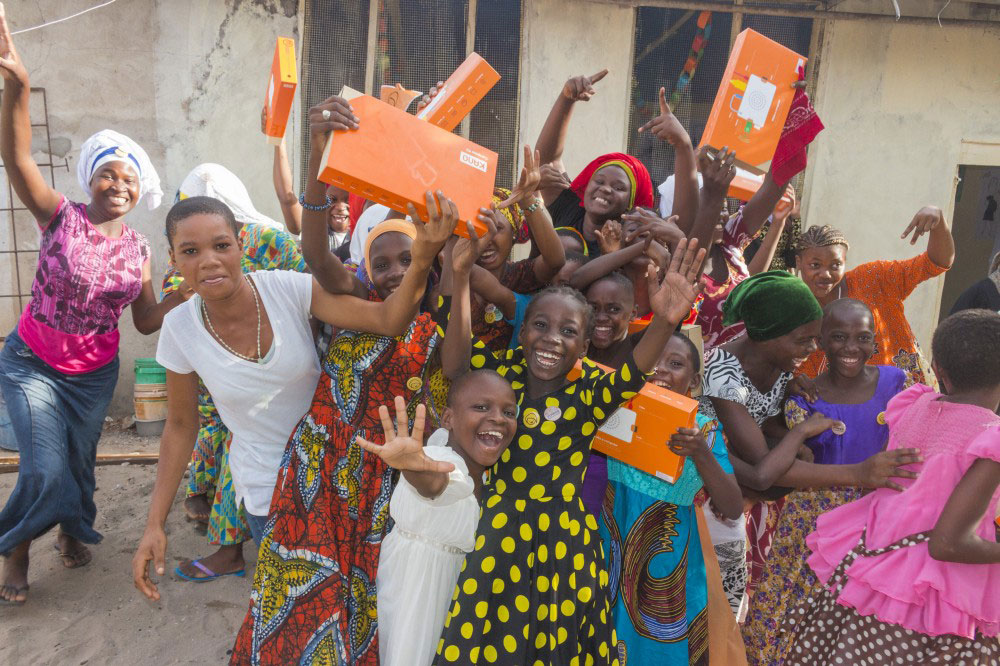
Sarah Brown, President of Theirworld says with a safe space to learn and play, a mentor to inspire, and access to technology to be able to explore, create, and code they can increase learning opportunities and empower girls to fulfill their potential.
Every girl should have the opportunity to go to school, learn, grow, and have a future they choose.
“At Theirworld, we know that investing in a girl has social and economic returns that go beyond her, extending not only to her family and future children, but also to her community. We don’t shy away from challenges and are prepared to tackle the big problems that stop children from learning,” added Sarah Brown.
Code Clubs run once a week in six month cycles. Girls will be taught a bespoke programme of online coding content by a trained teacher, and given access to numeracy, literacy, art and music to support their formal education. The Kano computer kits used in the clubs are low-cost, easily transportable, can be rebuilt multiple times and are highly applicable in countries where connectivity is low.
Join the world’s biggest family

